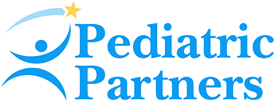Families with children who struggle with feeding issues often find mealtimes stressful and unpleasant. At Pediatric Partners, our therapists work hard developing and implementing strategies to help restore that bonding time for families. Recently, several members from our speech-language pathology and occupational therapy teams spent time digging deeper into approaches and techniques to better address these challenges with children and their families.
Speech-Language Pathologist (SLP) Krista Murray, Halley Nordskog, Erica Ulmer, Jessica Van Keulen and Occupational Therapist Rebecca Gaikowski attended a three-day, intensive training, “When Children Won’t Eat: Picky Eaters vs. Problem Feeders” in Chicago. During this training, these professionals focused heavily on learning how to apply the Sequential Oral Sensory (SOS) approach to working with children having difficulty with feeding. This approach integrates positive, sensory motor, behavioral learning and medical and nutritional factors to comprehensively evaluate and manage children with feeding and growth problems. It is a child-led approach that uses structured routines, parent and peer modeling and lots of positive reinforcement to empower and comfort children when encountering new and non-preferred foods.
Also, Occupational Therapist Stephanie Carlson and Speech-Language Pathologist Brinn Richards attended “Feeding Therapy: It’s Not Just About Swallowing.” At this two-day conference, the therapists concentrated on methods to help families improve mealtime experience using applied behavior analysis. They learned ways to increase a child’s participation in eating, to encourage trying new foods, to improve independence during feeding activities and to better tolerate food textures.
Finally, Occupational Therapist Alyssa Sauvageau learned strategies and intervention techniques to help expand a child’s feeding skills, broaden their food choices and to provide adaptive ideas to improve mealtime at the conference “Assessment and Intervention for Pediatric Feeding Disorders.”
Our team of professionals is excited to implement these techniques into their therapy sessions. For more information about these programs or feeding concerns, contact us at 888-875-5262 or [email protected].

